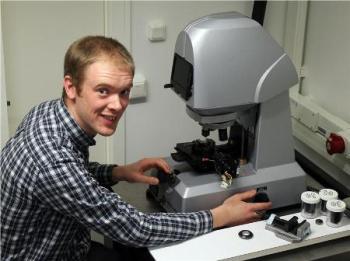Mar 21 2013
A new model to explore how new ideas affect fuel consumption in large diesel engines has been developed by a world-leading research group in tribology, at Luleå University of Technology. Tribology is the science of interacting surfaces in relative motion, of which there are many examples to be found in an engine. Friction and wear can be reduced by, amongst other things, effective lubrication.
 Andrew Spencer, researcher in tribology at Luleå University of Technology
Andrew Spencer, researcher in tribology at Luleå University of Technology
– We believe that with the development of our simulation model we can significantly reduce unnecessary friction, and thus reduce the fuel consumption of a diesel engine. This can lead to huge cost savings in the transport sector and great environmental benefits, said Andrew Spencer, a researcher in tribology at Luleå University of Technology working in collaboration with Scania CV.
Right now a major international conference in tribology at Luleå University of Technology is taking place. Around 150 participants from 26 different countries including China, India, South America, Saudi Arabia, Ghana and the United States will be in attendance. The tribology group at Luleå University of Technology is one of the leading research groups in this field, with a team of researchers who are pioneers in simulation, modelling and high-tech tests.
One area of research in tribology at Luleå University of Technology that the group is committed to is reducing fuel consumption in large diesel engines. In a diesel engine a significant proportion of the engine power must be used to overcome mechanical friction, which leads to unnecessary fuel consumption. This costs money and causes unecessary carbon emissions. The largest contributor to this mechanical friction in an engine is from the contact between the piston ring-pack and cylinder liner. While this friction should be minimised, at the same time the piston rings must conform well to the cylinder liner so that blowby (the leaking of combustion cases from the combustion chamber, past the ring-pack, to the crankcase) is kept to a minimum, in order to maintain a high engine efficiency.
These are the problems Andrew Spencer studied, developing a simulation tool to model the piston ring-pack to cylinder liner contact and from there evaluating the efficiency of large diesel engines. He has studied the problem through both simulation and by running experiments to validate the simulation in a test rig, measuring both friction and the thickness of the lubricating film in between the current cylinder liner and piston rings in a truck engine. The research shows how friction and the sealing ability of the piston ring-pack interact, and how the piston ring-pack can be optimized to minimize friction and thereby reduce fuel consumption in truck engines. The development was done in close cooperation with Scania and simulation tool will now be used by Scania for future engine development.
- One of the main objectives of the automotive industry today is to reduce the energy consumption of engines. Through our new model we can simulate and optimize the contact between the piston ring pack and cylinder liner. This should allow for quicker and cheaper engine development by reducing or eliminating cumbersome full engine tests. Full-scale engine testing costs huge sums for the automotive industry, and now we hope to be able to contribute to reducing these costs, says Andrew Spencer.
His results have recently been published in the scientific journal The Proceedings of the Institution of Mechanical Engineers Part J: Journal of Engineering Tribology